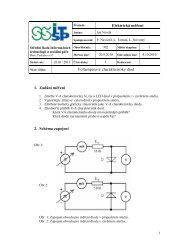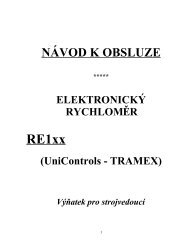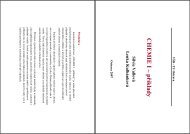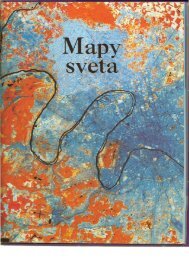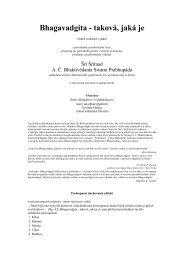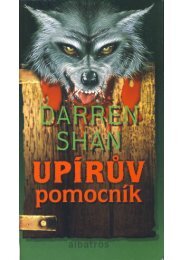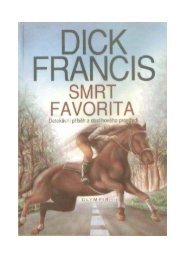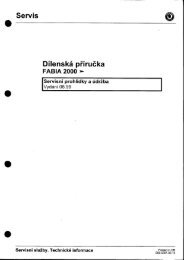Create successful ePaper yourself
Turn your PDF publications into a flip-book with our unique Google optimized e-Paper software.
<strong>Dick</strong> <strong>Francis</strong><strong>Rat</strong> <strong>Race</strong><strong>Dick</strong> <strong>Francis</strong>Drahý časINTRODUCTIONI learned to fly in the Royal Air Force during the Second World War, and in the course of the 1940s flew Spitfire fightersand later Wellingt n and-Lancaster bombers, amassing hundreds of hours in the air. On the thrifty novelist's premissof not wasting any of life's experi<strong>en</strong>ces I decided to base one of my stories on flying but not in wartime), the resultbeing a book called Flying Finish.My wife, Mary, helping me with earlier research for that book, undertook to go up for three flights in a light aircraft tofind out about up-to-date civilian air regulations, which of course hadn't be<strong>en</strong> in exist<strong>en</strong>ce during the War. To our mutualsurprise, Mary at once developed an <strong>en</strong>ormous <strong>en</strong>thusiasm and aptitude at the controls, and in time became aqualified pilot herself From this almost accid<strong>en</strong>tal beginning she w<strong>en</strong>t on to take an Instrum<strong>en</strong>t <strong>Rat</strong>ing - approximatelya master's degree in flying - and was commissioned to write a flying teaching book for absolute beginners which becamerecomm<strong>en</strong>ded reading in British Airways pilot training schools.We bought three light aircraft, two of them to lease to a flying training school and one, a fast little sports-car equival<strong>en</strong>t,for Mary to fly personally. People like jockeys, trainers and owners began asking her to fly them to the races, andev<strong>en</strong>tually as a result we set up a small professional air-taxi and charter operation, employing six experi<strong>en</strong>ced BritishAirways pilots in their spare time - not Mary herself - to fly our paying pass<strong>en</strong>gers round the British Isles and Europe.Mary arranged the flights, smoothed their way and ran the records and business side.<strong>Rat</strong> <strong>Race</strong> is about taxi flying. (Never waste experi<strong>en</strong>ces!) While I wrote the book, our own taxi business filled our daysso that I was constantly surrounded by the raw materials of the story. Aircraft became the book's c<strong>en</strong>tral characters,air procedures its structural bones. One might ev<strong>en</strong> say that page by page and hour by hour I lived and breathed thesame basic concerns as my chief character, pilot Matt Shore.As <strong>Rat</strong> <strong>Race</strong> is fiction, Matt Shore's more dangerous problems did not arise, I'm glad to say, in the sev<strong>en</strong> years of ourown air-taxi firm's life. We sold the successful little business finally to one of our chief customers and it is operatingstill, though changed and expanded, conc<strong>en</strong>trating more on Euro-businessm<strong>en</strong> as pass<strong>en</strong>gers and less on the racingsc<strong>en</strong>e.CHAPTER ONE 1I picked four of them up at White Waltham in the newCherokee Six 300 that never got a chance to grow old.The pale-blue upholstery still had a new leather smell andthere wasn't a scratch on the glossy white fuselage. A nicelittle aeroplane, while it lasted.They had ordered me for noon but they were already inthe bar wh<strong>en</strong> I landed at elev<strong>en</strong>-forty. Three double whiskiesand a lemonade. Id<strong>en</strong>tification was easy severalchairs round a small table were draped with four lightweightraincoats, three binocular cases, two copies of theSporting Life and one very small racing saddle. The fourpass<strong>en</strong>gers were standing nearby in the sort of spreadaboutgroup indicative of people thrown together by businessrather than natural fri<strong>en</strong>dship. They were not talkingto each other, though it looked as though they had be<strong>en</strong>.One, a large man, had a face full of anger. The smallest,evidefitly a jockey, was flushed and rigid. The two others,an elderly man and a middle-aged woman, were steadfastlystaring at nothing in particular in the way thatmeant a lot of furious activity was going on inside theirheads. I walked towards the four of them across the largelounge reception room and spoke to an indeterminate spotin mid-air."Major Tyderman?"The elderly man, who said "Yes?", had be<strong>en</strong> made a majora good long time ago.Nearer sev<strong>en</strong>ty than sixty but still with a tough littlebody, wiry little moustache, sharp little eyes. He had thinsalt-and-pepper hair brushed sideways across a baldingcrown and he carried his head stiffly, with his chin tuckedback into his neck. T<strong>en</strong>se very t<strong>en</strong>se. And wary, looking atthe world with suspicion.He wore a lightweight speckled fawn suit vaguely reminisc<strong>en</strong>tin cut of his military origins, and unlike the othershad not parked his binoculars but wore them with thestrap diagonally across his chest and the case facing forwardson his stomach, like a sporran. Club badges ofmetal and coloured cardboard hung in thick clusters ateach side.Vyzvedl jsem všechny čtyři ve White Walthamu. Letěljsem novým cherokee šest 300, kterému nebyla dánašance zestárnout. Bledě modré čalounění vonělo novoukůží a na blyštivém trupu nebylo ještě ani jedinéškrábnutí. Bylo to pěkné malé letadlo.Objednali si mne na poledne, ale když jsem ve tři čtvrtina dvanáct přistál, čekali už v baru. Měli před seboudvojité whisky a limonádu. Poznal jsem je snadno. Kolemjednoho z malých kulatých stolků byly židle, na nich sepovalovaly výtisky Sportovního života, jedno lehkézávodní sedlo, opěradla byla ověš<strong>en</strong>a čtyřmi plášti dodeště a třemi pouzdry na dalekohled. Cestující stáliopodál. Na skupince bylo vidět, že její čl<strong>en</strong>y nepojiloskutečné přátelství, j<strong>en</strong> obchodní zájmy. Nemluvili spolu,ale zdálo se, že hovor musel ustat j<strong>en</strong> před malou chvílí.Jed<strong>en</strong> z cestujících, vysoký rozložitý muž, se tvářildopál<strong>en</strong>ě. Drobný štíhlý člověk, zřejmě žokej, měl obličejrudý vzteky. Zbývající dva, starší pán a paní ve středníchletech, se dívali vytrvale do prázdna a bylo na nich vidět,že usilovně uvažují. Přešel jsem rozlehlou halu a přistoupilke skupince."Major Tyderman?" oslovil jsem vzduch nad jejichhlavami."Prosím," ozval se starší pán, který zřejmě získal hodnostmajora před pěknou řadou let.Odhadl jsem, že musí být blíž k sedmdesátce než kšedesátce. Byl hub<strong>en</strong>ý, šlachovitý, měl malý ježatý knír,ostré, pichlavé oči a popelavě šedé vlasy měl sčesány přesolysalé tem<strong>en</strong>o. Držel se strnule, páteř rovnou, braduzaraž<strong>en</strong>ou do límce. Vypadal napjatě, velmi napjatě. Bylve střehu a na svět se díval podezíravě.Měl na sobě lehký světle hnědý oblek, který střihemtrochu připomínal voj<strong>en</strong>skou uniformu. Na rozdíl od svýchspolečníků neodložil dalekohled na židli, ale měl jejzavěš<strong>en</strong>ý šikmo přes ram<strong>en</strong>o. Pouzdro ověš<strong>en</strong>é spoustouklubovních odznaků mu viselo na břiše.5





